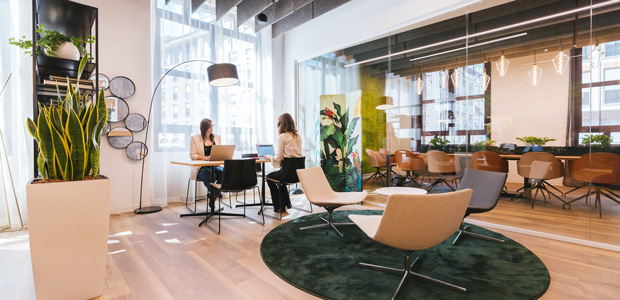
How office design is shaping employee wellbeing
As we all prepare for the reality of returning to the office, businesses are asking for more in a workspace - from allowing 'pandemic pets' in the building, to flexible contracts, and creating an environment which keeps employees' physical and mental wellbeing front of mind.
And with the focus on bespoke private spaces increasingly designed around wellbeing, mental health and collaboration, WorkPad CEO Edward Griffin has shared key emerging trends in office design as it moves to the forefront of redefining the office, ensuring new demand for ergonomic destinations can be met, while at all times putting employees at the heart of its spaces.
1) It’s so stuffy, why can’t I just open the window?
Allowing us to be the captains of their own health and comfort is hugely empowering, reduces a sentiment of helplessness and increases a sense of wellbeing. This can be as simple as opening a window, or as technological as installing a compliment of IoT devises measuring: CO2, humidity, temperature and occupancy.
This data can be displayed, permitting us to understand the health-impact of our environmental conditions, and modify these conditions if desired.
2) Circadian Lighting: Lighting to fall asleep to
Installing the right colour temperature and intensity of light in our workplaces can influence our quality of wakefulness. This enables us to better concentrate and perform at work, meaning towards the end of the day, we are primed to sleep effectively.
3) Biophilia: Bring Nature Inside
Biophilia describes our innate tendency to seek connections with nature. This association results in a better sense of wellbeing. As most urban-dwellers spend more than 90% of the working day indoors.
In order to safeguard our wellbeing, it is essential to maintain these links with nature, through bringing planting inside or creating visual and physical connections to the outside.
4) Sitting is the new smoking
Standing burns more calories than sitting, and encourages movement and keeps us alert: especially useful during those afternoon slumps. Standing desks reduce blood pressure, increase productivity, boost your mood and help to prevent back pain from bad posture.
5) Just take the stairs
Make circulation spaces vibrant and memorable to encourage regular and elevated movement.
6) If you have to sit, sit properly.
Ergonomics ensure our body is positioned correctly, meaning the loading on our muscular skeletal framework does not lead to chronic injuries.
7) Shhh!
For deep work, we need calm and quiet to think and process efficiently. In addition, noise can lead to stress and the feeling of helplessness. Noise-free focus areas are key in achieving this.
8) Pardon, what did you say?!
Along with areas for protected independent work, we need places that encourage interaction, discussion and learning. These are the places that help build our tribe; it is in these spaces that the synergy between differing wisdoms germinates, and where priceless new ideas are formed.


